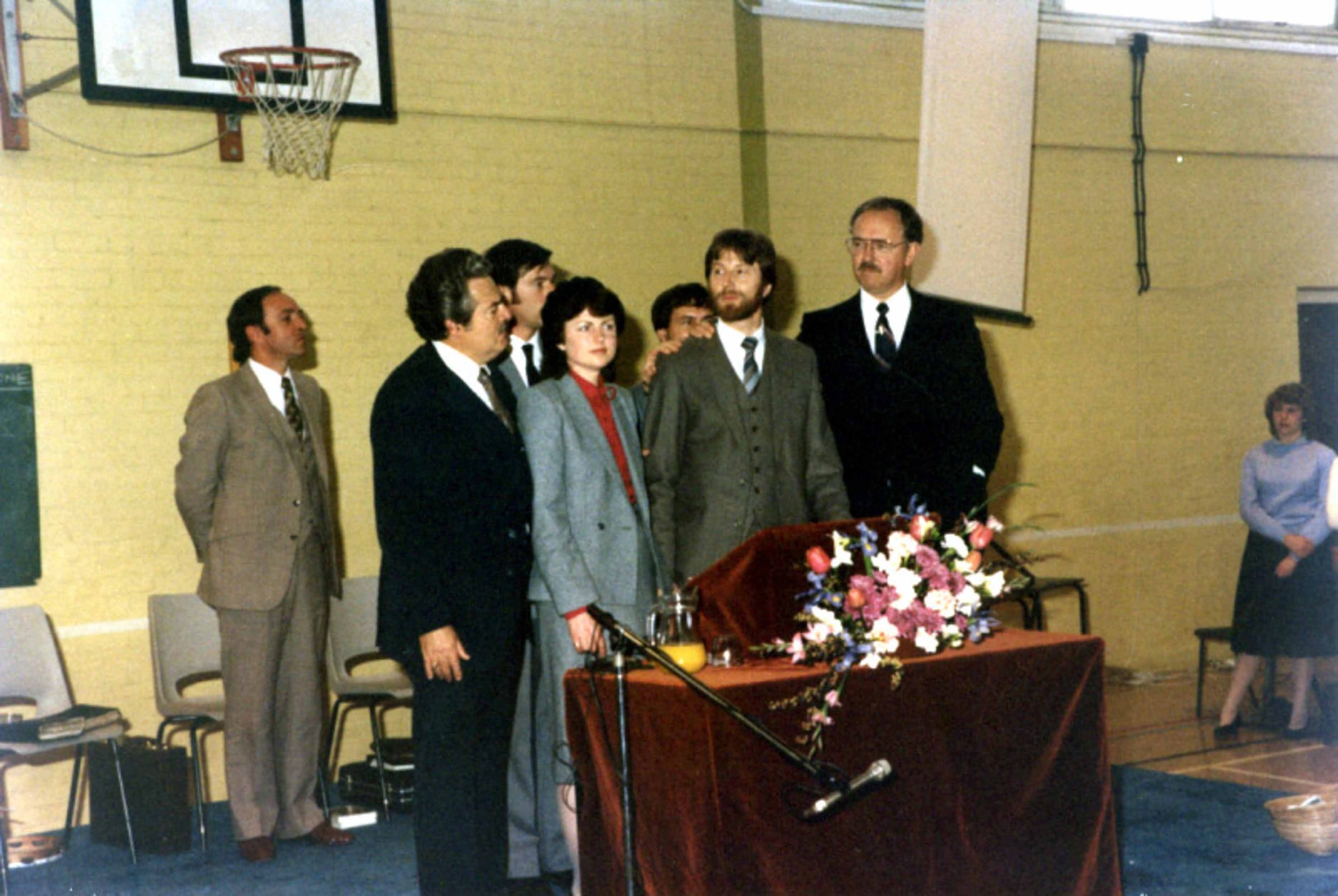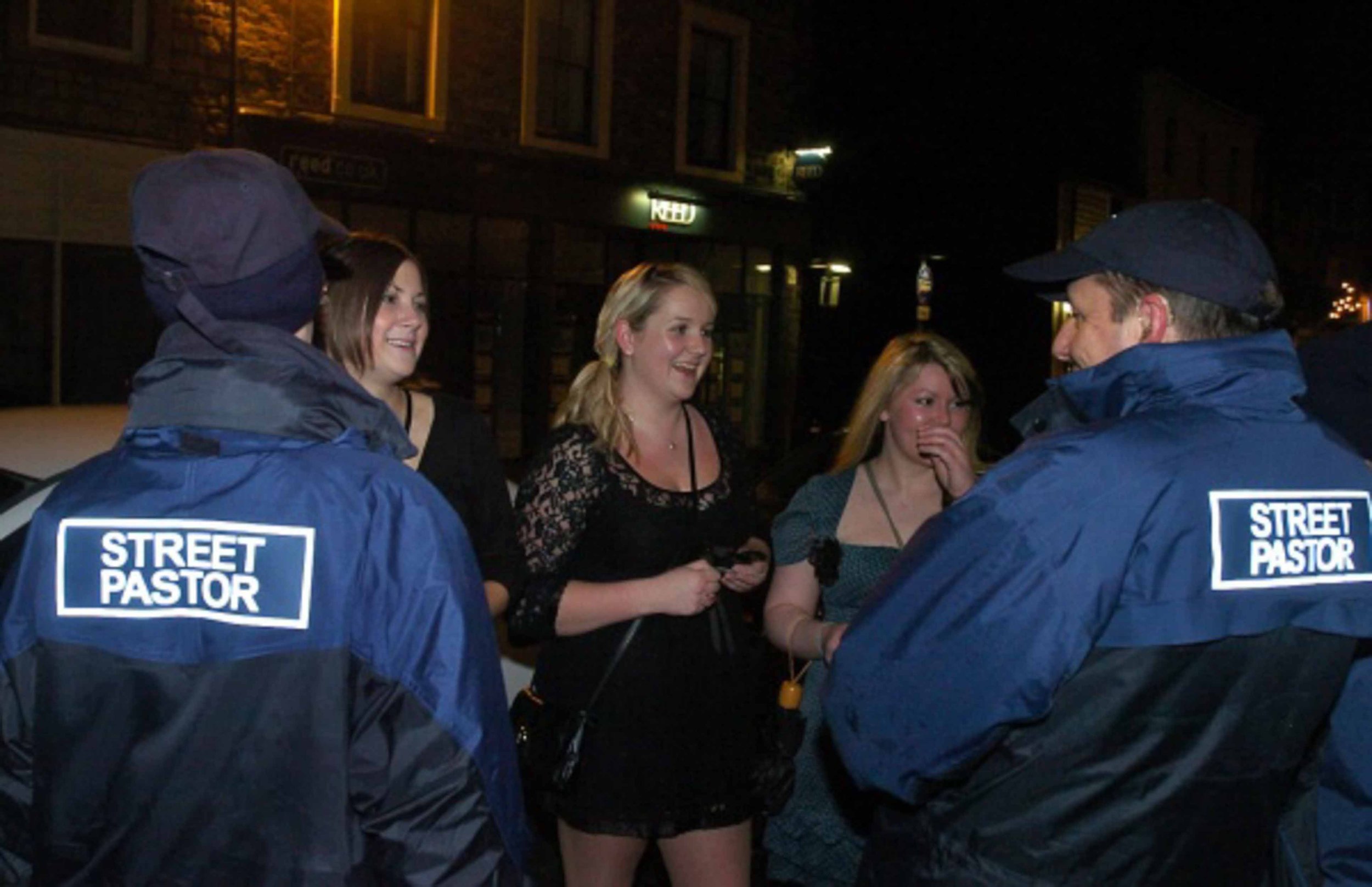our story
1908
Rev Alfred Bird, an ex-missionary from Whitchurch, formed a Baptist church in Basingstoke and conducted services in the Town Hall. Very soon the former British School building on Sarum Hill was acquired and the new church was officially opened on 8 June 1908. Baptist church meetings continued on these premises for 68 years.
1960
A young pastor with a Pentecostal background was appointed to lead the church. Mike Pusey stayed just five years, but long enough to lay a foundation on which a former Metropolitan policeman would be used of God to lead the church into a fresh discovery of the power and gifts of the Holy Spirit…
1966
That policeman was Barney Coombs, who, alongside his wife Jeanette and three children, began his ministry in Basingstoke in 1966. He was instrumental in reshaping the church to accommodate: a more informal style of worship; the regular use of the spiritual gifts in church meetings (including speaking in tongues and prophecy); the emphasis of house groups as a basic unit of church life and the place where individuals could find pastoral care, fellowship and personal development, and where new leadership could emerge; the breaking down of traditional denominational barriers; and a renewed long-standing missionary focus.
Despite losing some members who objected to the changes and emphasis on the ministry of the Holy Spirit, members gained far outweighed those lost.
1977
Through a mutual agreement with the Baptist Union, the church ceased to be 'Baptist' and became known as Basingstoke Community Church. About the same time, Barney & Jeanette moved to Canada to pastor a church in Vancouver, British Columbia. Vic Gledhill, a former missionary in Nepal, arrived with his wife Jenny and family and took up the reins of leading the church, which had continued to grow to such a size that a new Sunday meeting place was needed. As a temporary measure, meetings were held at the Carnival Hall from October 1978 for a few weeks, before transferring to the assembly hall of Richard Aldworth School in Western Way.
The church continued to meet as one congregation until 1980, when on 14 June, the membership divided into six communities, each using local facilities for Sunday meetings, and then all coming together for a ‘celebration’ gathering on the first Sunday of each month at Richard Aldworth School.
1981
After Vic & Jenny had moved on to lead a church in Walsall and Bruce Blow (one of the full-time pastoral team in Basingstoke) had led the fellowship for a short while, Barney asked Dave & Chris Richards to move from Derbyshire and for Dave to take over the senior pastor's role. Under Dave & Chris’ ministry continuing growth and development of the Church took place.
Relationships were established with overseas churches, especially in Africa, while major pioneering initiatives at home took place. 1981 also saw the founding of The King's School - fulfilling the church's vision to educate its own children - and the setting up of the Pregnancy Crisis Centre - helping women facing a crisis pregnancy to find sympathetic help and advice..
1996
Dave released local hand-on responsibility to fulfil wider responsibilities in the body of Christ. He maintained Basingstoke as his base and gave input to the Church, but the senior pastor’s role was taken by David Marchment alongside his wife Hazel. Under Dave’s leadership the emphasis on local outreach grew. In this period was the participation of the church in what became known as ‘the Toronto blessing.’ Also of note were the growing relationship of deep trust between ministers in the town, and the formation of the interdenominational “Network Ministers” of which the Community Church was an active part.
Sadly in 1997 Dave was diagnosed with leukaemia. Although he experienced times of remission Dave died from this in 2002. During Dave’s illness Andy Taylor, and Dave Downer, two congregation leaders, held the Church on course.
2001
Change has been stamped into Basingstoke Community Church's vocabulary, and in January 2001, a further significant restructuring of the church took place. Each of the six congregations became self-governing churches, although retaining a strong family identity. They were grouped together under the title of Basingstoke Community Churches.
The Churches were now governed by their own local elders and leadership teams. A wider sense of family was to be maintained through the formation of an Area Team which later became an Apostolic Team . This was made up of the senior leaders of each Church and various BCC’s wide ministries. Its role was to bring oversight to the family together, to be an arena of shaping and provocation in God for the various senior leaders and ministries, and to consider any strategies for BCC’s as a whole.
This team was led by Phil Norris, who had grown up in the Church, was leading one of the congregations, and had recently returned from two years biblical study at Regent College, Vancouver, with his wife Helen and three children. The place of the word, the raising of a new generation, and considering how the Church should look in a changing culture and society were ongoing emphases in the Churches. Gradually younger leaders were being raised, to work alongside those more established and there was a sense that together God was leading BCC’s on a new journey of faith and adventure. A fresh consideration of overseas mission took place and relationships built in Brazil, Tanzania and Czech Republic.
Locally BCC’s joined forces with many other churches in a whole variety of projects such as Street Pastors, Money Lifeline and Basingstoke Town Chaplaincy.
2008
The Apostolic Team spent time considering shared vision and at that time centred around what it described as four pillars: these were being a Pioneering Community, a Relational Community, a Learning and Equipping Community and a Whole of Life Community. These emphases shaped ‘celebration’ gatherings over the coming year, communications across the churches, and the shared Exploring BCC’s course for newcomers. The desire to have a broad all-encompassing vision that gave space for the many and diverse visions, calls and vocations of God’s people lay behind this approach. This approach was influential for some years.
2012
The desire of the churches to pursue God’s mission led to a new initiative called ‘Going More Missional.’ Its aim was to encourage a whole variety of initiatives, both existing and new, as vehicles for blessing the town and region, and for demonstrating the gospel. Many new initiatives were started and others given fresh impetus. With this a deliberate emphasis was put on training and input around reaching out, and considering ways of not only demonstrating the gospel but also proclaiming it. External input and equipping was sought. This was an exciting period.
2016
The decision was taken to close The King’s School after 36 years. This was a sad and difficult period. In light of this change, there was a review of BCC’s in which questions about future direction and shape were explored. The outcomes from this review sought to refocus the shape BCC’s future, with greater emphasis on local autonomy, whilst still retaining a shared sense of identity and vision. Three churches were amalgamated to create a new ‘hub’ church, and fresh impetus given to the remaining three churches.
The strap line ‘Galvanised for a decade of growth and impact’ gave some coherence to the way ahead, as BCC’s sought to be better shaped reaching and transforming the town and region. There was also some streamlining of activities and expectations to make room for mission and outreach became a priority.
2020 Onwards
Like every other organisation, BCC’s, was impacted by the Corona virus outbreak and lockdowns. Leadership teams expended much energy providing on-line connection for both their own members and those looking. Alpha, small groups, prayer opportunities, bible studies and services all migrated on-line, some of which have continued post lockdown. Some potential for non-geographic communities was realised, and although in-person gatherings returned, for some identity and belonging surpasses geographic proximity. There has been fruit through these innovations and developments, and we continue to watch with interest what God the Holy Spirit is doing.
Each church now has its own distinct vision and practice, and yet the sense of being connected to one-another remains. The emphasis on mission only grows as the churches grapple with communicating the gospel to a generation who have all been impacted by loss through Covid and many of whom do not have the spiritual background, which even if dormant, could be drawn on for previous generations. It is an exciting and interesting time to be the Church.











